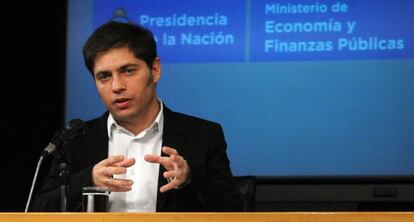Argentina to negotiate payments on “vulture funds” with US lenders
The country has a 30-day grace period to pay up and avoid defaulting on its loans


To negotiate or not to negotiate. In order to avoid defaulting on its sovereign debt, Argentina has no choice but to sit down with the holdout investors who refused to give the country a discount on its loans in 2005 and 2010. Late President Néstor Kirchner (2003-2007) and incumbent President Cristina Fernández have used various appeals to avoid these negotiations for 10 years. Now, after a ruling from the United States Supreme Court, New York Judge Thomas Griesa has ordered the parties – three “vulture funds” and the Argentinean government – to sit down and negotiate, with attorney Daniel Pollack as mediator.
Argentina decided to take up the judge’s challenge and on Monday afternoon its government published a statement saying it will send a delegation to New York next Monday, July 7, to meet with the mediator. These talks will mark the first gesture of rapprochement between the parties. Still, the road ahead will not be easy.
“Argentina reiterates its desire to negotiate fair, equitable and legal conditions that take into account 100 percent of its creditors, which specifically means that they would allow [the government] to make the payments due to holders of its restructured bonds,” Argentina’s Economy Minister Axel Kicillof wrote in the announcement. The majority of its creditors – 92.4 percent – hold restructured bonds, meaning that they agreed to at least a 60-percent discount on repayment. The government calls the others “vulture funds.”
Paying “the vultures”
the debt amount they claim
would be a form of “extortion,”
says Argentina
The statement was published hours after Jay Newman, investment manager at Elliot Management, the parent company of NML Capital, and one of the three plaintiffs, said: “Argentina has refused to negotiate any aspect of this dispute. There are no ongoing negotiations. There have not been any and Argentina refuses to commit to negotiations in the future. We sincerely hope it reconsiders this dead-end path.”
Both the president and Kicillof have said that paying “the vultures” the debt amount they are claiming from the Argentinean government would be a form of “extortion.” Yet, that is exactly what Judge Griesa has ruled: Argentina must pay the three plaintiffs the $1.3 billion they are claiming. Until it does, the South American country cannot liquidate the discounted debts its other creditors hold.
Argentina was supposed to pay $539 million by June 30 to the creditors who accepted discounts. To that end, the government sent the money to the Bank of New York Mellon. Judge Griesa, however, has deemed such payments illegal until Argentina pays off the three plaintiffs. The situation would have been worse for the South American country had the judge embargoed the $539 million. Instead Griesa blocked the payments, issued an official warning and ordered all parties to find a solution.
The country has a 30-day grace period to make the payments and avoid defaulting on its debts or it will face a situation that could have unpredictable consequences.
Translation: Dyane Jean François
Tu suscripción se está usando en otro dispositivo
¿Quieres añadir otro usuario a tu suscripción?
Si continúas leyendo en este dispositivo, no se podrá leer en el otro.
FlechaTu suscripción se está usando en otro dispositivo y solo puedes acceder a EL PAÍS desde un dispositivo a la vez.
Si quieres compartir tu cuenta, cambia tu suscripción a la modalidad Premium, así podrás añadir otro usuario. Cada uno accederá con su propia cuenta de email, lo que os permitirá personalizar vuestra experiencia en EL PAÍS.
En el caso de no saber quién está usando tu cuenta, te recomendamos cambiar tu contraseña aquí.
Si decides continuar compartiendo tu cuenta, este mensaje se mostrará en tu dispositivo y en el de la otra persona que está usando tu cuenta de forma indefinida, afectando a tu experiencia de lectura. Puedes consultar aquí los términos y condiciones de la suscripción digital.








































